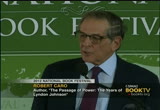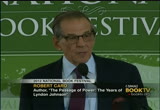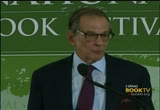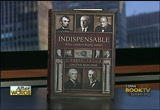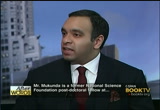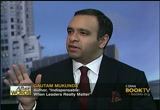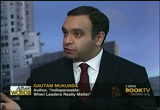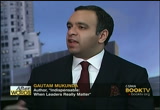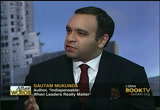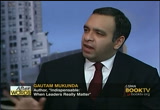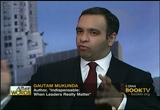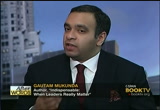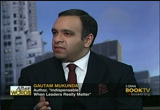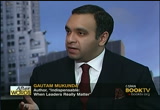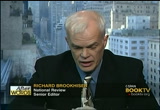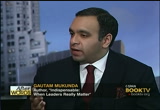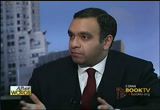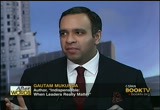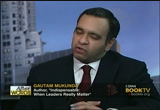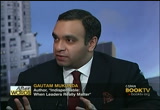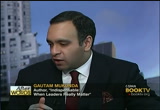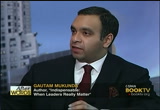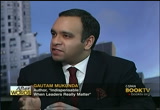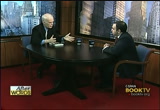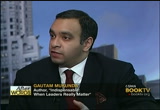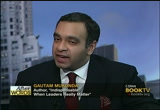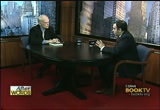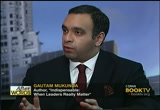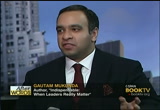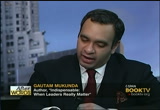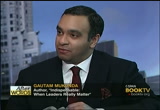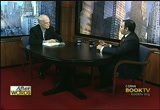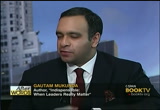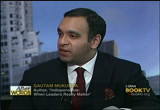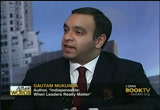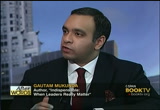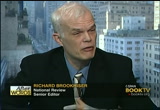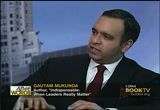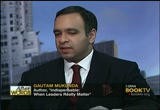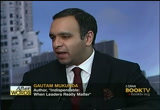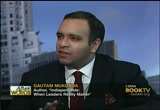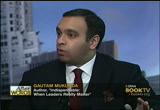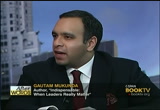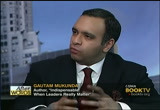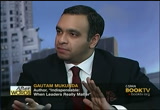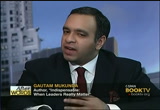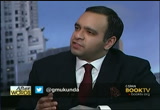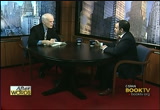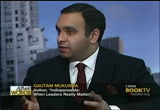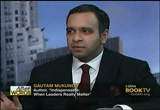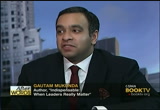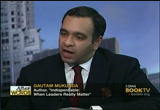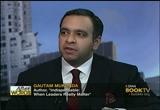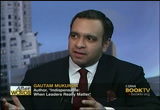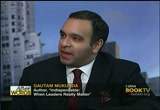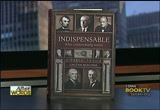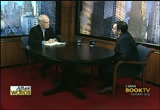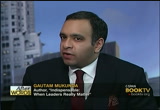tv Book TV After Words CSPAN December 25, 2012 5:00pm-6:00pm EST
5:00 pm
johnson, i wrote in that book no teacher had never cared if these kids learned or not. this teacher cared. he thought it was so important they learn english. and he was saying the boys and punish the girls if he heard a word in spanish. ..spanish. he would go among migrant worker shacks to get them so they would drive the kids to baseball games so they could have the debating team and baseball team like white kids. but the thing that got me. you could say that is just an example of lyndon johnson always trying to do the best job he could at whatever job he had and that is the character of johnson. i feel i know he really wanted to help because he didn't teach only the kids. he taught the janitor. the janitor's name was thomas coronado. johnson insisted he learned english. he brought a textbook and every
5:01 pm
day before and after school he and coronado would sit on the steps of a school and coronado says -- johnson would pronouns, i would repeat, johnson would spell and i would repeat. i think lyndon johnson cared about civil-rights. the second part of your question, how did he get kennedy -- it takes a lot of pages in this book to talk about all the things he does but the thing he does on the instant, this bill appears to be totally dead. he says didn't someone file a discharge petition? discharge petition had been filed -- this bill was in a committee that was never going to let it out. wasn't even the senate. still in the house rules committee which was shared by judge howard w. smith and would even give a date. the bill was going nowhere.
5:02 pm
johnson remembers someone filed a discharge petition to take away from that committee. that was -- a discharge petition ever -- never passed. violation of house rules and no president had ever gotten behind one before. johnson calls the representative who introduces it and representative of missouri has been told by the leaders dropped this thing and listen to johnson in this telephone call to see a genius in human nature because the first half of the call, we can't violate the house precedents. then up next on booktv after words
5:03 pm
with this guest host richard brooke highser. this week and determine when leaders matters the most. he discusses the lessons learned from those that made the greatest impact on those of their day. guantanamoprofessor we're here to talk about your book "undispensable: when leaders really matter" i want to say it's a delightful book to read. you deal with familiar figures that you found new things to say about them. you attack them from new ankles. let's dive in. you have one of your -- [inaudible] is a quote that gets a attributed to different people.
5:04 pm
independenceble and they can't be. life goes on when they die. all men do. but at the same time, so that the thing. i think it's the major one you to want to poke at the egg go the world would end when they did. it is a subtle reminder there are people in history around whom you can say almost say fate seems to hipping. without them events would have been different. it's not a fashionable thing to say. i think most historians would agree. there are indies penceble individuals. they were indies they wouldn't
5:05 pm
have been at all. now and you do go on to to say that it's a controversial notion among historians and policy fors and you have, i guess the two teams you cite are plato and karl marx saying it's not the cans. -- case and carlisle saying that it is. tell us what how they locked horns other this. >> well, it would have to be one of the oldest debate thaict history and social science. it's a date predates the idea there is a thing of social ions. if you go back to later the idea that social forces are what really explain human outcomes. the people were there, which different people died of heart attack and replaced by someone else. what happens the stuff that mattered would have ended up being about the same. marx famously make argument of napoleon. in the essay in theory about
5:06 pm
louis that poll began. it's not about him. it's about the class struggle of the social forces. it's become a history or political science without proper nouns. no people involved. car legal takes the most extreme opposite position. history is nothing but the biography of great men. it's caricatured as a after anothermen. you cannot get further apart in the view of the world than these two. both arguments make sense. the social scientist following in the tradition of, you know, not just marx but social scientists say there are three reasons why leaders don't matter that much. that the leader of any organization faces external constraint. if you are a ceo of a company
5:07 pm
you have a competitor. you can't set your price at whatever you want. they are constraints and all the things that happen inside a country or company or military unit. you can't do whatever you want. maybe most importantly leaders are a chosen randomly. most leader of powerful organization that we care that have the ability to reshape history. they're not picked out of a hat. they're pick the abuse the organization is looking for someone with some set of characteristic. >> the leadership process. >> i think every organizer should have a process. very few organizations are going to pick people randomly. it include company or countries. if you look in the the right way the scientist which aren't an organization at all. countries where if we look at the most recent presidential election in the united states. there were people people saying
5:08 pm
it's not this person. tim pawlenty drops off and michele bachmann drops off and left with a last person standing. it's not about picking a winner. it's picking losers. this is not the person. this is not the person. finally you get the last person standing. >> host: process of e elimination. >> which is consistent in whatever organization it is. i think it is in a sense is a simplified version of reality. i think you used a theory. theory start with simple and you make them more complex. if you take ge famous for the way it chooses lards. ge we always tell our students it's a company that works at practice but not in theory. it doesn't seem to do any of the things we say it should do. it's incredible profitable. if you have to pick them it's
5:09 pm
good at picking leaders. it's good at developing managers and picking the right people. ge spends twenty years selecting among the organization and slowly promoting them over and over and over again. and so the end of the day, twenty years, so you to work your way up. at the end of the day you get five finalist the who ceo picks one person from the finalists. you sympathy of the five finalists you should think two thingings. first, they are probably very good at the job. because they made it all the way to the top of ge. they made it to the top of a company that has been successful for hundred years. they are close to what ge is looking for. there's one thing you can be sure they are looking for that's a good manager. the other thing you should belief it doesn't matter which one gets picked. obviously manage to vent from the perspective say the ge share hoarmd.
5:10 pm
there are five people to make the way to the top. how different can they be? they passed through the twenty yearlong process. you have a name for leaders who emerge that way. >> right. >> host: i call those leaders idea many people who could become the leader if you could rewrite history a million times you wouldn't get the same person over and over again. you get random factors. you think about the presidential election in. george bush becomes. i can't think of anything more random in the weather in florida. those random events make different people people who the center of the distribution people likely to
5:11 pm
win people who have been evaluated or filtered by the process. another way is filtered leaders. they are cylinder. they have a lot in common with each other. if you can get power. somehow by bypassing process. something happens so the leader filtration process isn't able to evaluate you, and in the evaluation process recognize you are not whatever it is liking for for whatever reason and stop you from getting pow. those people i call them unfilleddered can be on the extreme for distribution of people who might gain power. >> these people are not stopped even though the deck is stacked against them. >> that's right. the evaluation process can't be triggered. if you inherited control of your company you are inherited the evaluation process never kicks in. even if people know you will go a bad shop.
5:12 pm
>> in the leadership process we have the model leaders and sometimes the extreme leaders. you have two sets of leaders that you look at the ore is prime minister of great britain since 1832 changed. so let's start with a president. why can you pick -- why did you pick the presidency as a case study? >> there were a bunch of reasons. one is importance. i think when you're doing -- [inaudible] you can live with that. i think part of our job i'm an academic part of my job is answer questions that matter. that have an impact on the world. he can describe the president of the united states as the most powerful person in the world. i think that's probably true. that's a fair description. so surely if i can do something to attribute to how we pick the
5:13 pm
people and how we can pick them better, that's a great idea. so just by itself. i think it's sort an only obligation to look at important issues that matter. the president is a perfect test case for reasons. one is dpap the american government is so wonderfulfully transparent and carefully chronicled you can get information not just about every president but every person that almost became president and you can get the memos that you wrote to each other. i think we should do this and argue about it. i can see, okay, if it wasn't abraham lincoln who was likely to become president in 1860. i can get an answer. it almost certainly would have been william henry who was the secretary of state. that's great. i can go back and look at the memo he wrote to lincoln about what he wanted to do and what lincoln wanted to do and what was cone. i can get a good proxy for what might have happened if the ore
5:14 pm
would have gotten the job. measure what the impact of lincoln was. if you're thinking about individual impact, i don't think it makes any sents to say the person was here about decision was made therefore it's about them. if anybody would have made that same decision, it's not about them. japan attacks pearl harbor on december 7, 1941, franklin roosevelts has to decide if we are going to declare war on japan. we were going. >> no conceivable american politician would have declared war. >> no politician who would have become president. that's right. >> host: you pay particular attention to three presidents, thomas jefferson, abraham lincoln, you already mentioned and woodrow wilson. let's do them in chronological order. let's start with jefferson. he it a extreme president?
5:15 pm
>> guest: a model president. how they are they were evaluated before they became president. if everyone had the ability to influence whether or not they would get the job, knew everything about them. then the people have a ability to recognize the person is not what we want or the person is what we want. and they pick jefferson. if you look at jefferson's career, he had been governor of virginia, ambassador of france, secretary of state, vice president of the united states, member of the congress. author of the decoration of independence. it's one of the few people in english history have been evaluated or inspected as closely as thomas jefferson was before he became president of the united states. people were looking at him and saying this is the guy we want. this is the person who should be president. >> host: the opponent said this isn't the guy we want. it was a close election. >> guest: it was. it was a strange election.
5:16 pm
>> host: it was strange election. it was hard fought. he had a lot of animation. you're saying, i guess what you're really saying is that both the supporters and the opponents knew who they were talking about. >> guest: partly that. what i'm saying is that especially when parties become ideological. any democrat is going different from any republican or any democrat is going different from any federalist. if you're measuring individual leader impact you shouldn't measure the democratic you should measure against the democrat who would have been there if that democrat had not the first one hadn't gotten the job. >> if jefferson had been run over a carriage and killed some other member of the party would are contested that. >> i think the oh member of the party is james madison. when you look at jeerson what we want to baseline jefferson against what would madison have done in jefferson's shoes. madison is the likely alternative.
5:17 pm
and madison had been filtered and likely to be a model candidate. if the dice rolled differently maybe yawn adams get the presidency and -- keeps the presidency in 1800. you should take a gla glance at john adams. jefferson is versus madison what happened there. jefferson is evaluated and becomes the presidency the election for 1800 is excited. in some ways the most exciting election in american history because jefferson from aaron burr. the idea of burr from the united states. again, random things matter. this is why the argument of broader social forces is un-- if he becomes president it's hard to majtd whereabout. he doesn't and he doesn't because in large part people realize are ron burr is not someone they want near the white house. jefferson becomes president and
5:18 pm
jefferson the question is how much could matter? and if you look at the jefferson administration, historians are overwhelming the most important event of the jefferson administration was louisiana purchase. that's not surprising. if you double the size of the country peacefully and almost no cost, the enormous achievement for for any president. any president would want that on the résume. so is jefferson a high impact president. if he had not been there, would the louisiana purchase happen anyway? and if you look there what you see is jefferson sent missionary to france to buy the louisiana territory. he didn't he sent them to buy the city of new orleans from fraps. the louisiana territory as a whole was not mentioned by anyone in the united states as even a possibility. so they traveled across the atlantic and lands in france and starts traveling toward paris. and before he arrives in paris,
5:19 pm
the american ambassador who was already there robert living stone approached who is that poll yon's foreign minister and said how would you like to boy the interterritory of louisiana. it's not vising living stone said yes. let's do it. they negotiate and they arrive and they complete the negotiations. they are -- james monroe. who would become marylandson's secretary of state and would then become's madison's suck receiver as president. we have a bunch of people who would be president almost president, evaluated. mob row and living stone complete the negotiation. they are not difficult. the french want to sell. they bigger problems with the britain. >> host: they want the cash. in louisiana they decided is a write off. >> that poleon thinks the united states is going grab louisiana. they are too concerned to
5:20 pm
protect it. and he cede with the sort of foresight that gives the repetition of a gene use. jen use. it might make them so powerful no one in europe can stand up to this em. a century from now is not my problem. the news goes back. they take the news of the purchase back. the news arrives in boston. boston is the federalist tear toy. it's the opposition for the jefferson administration. that want to deprive jefferson of try yumple. they set off a fireworks display. it wasn't a controversial thing in american politics. no. american politicians were really enthusiastic about this. news gets to washington, and the senate starts to debate the ratification of this and the only nature of the obstacle arises jefferson himself lead
5:21 pm
him to believe that the federal government did not have the power to acquire a territory. and he starts to hem and haw say we need a constitutional amendment to give the government the power. napoleon back in france had overthrown the government. he was not exactly -- >> host: constitution nap. >> guest: yeah. not repressed by the argument. he started make noises saying i'm going revoke the treaty. madison, our baseline alternative comes to jefferson. -- >> host: the secretary of state. >> guest: right. closest friend. secretary of state in the room for every negotiation. he said you can't do this anymore. you have to agree and yield it's too big an turn to let your sphrict view. he agrees and he back down. they make purchase. jefferson displays a great deal of skill. the negotiation he choose monroe, absolutely the right person. he gets through the senate, successfully, manages all the
5:22 pm
things. so he displays flexibility, but think about flexible because he's willing to override the own. it's too big an opportunity let us construction view of the government. stop us. we have to get the land. they did. skill and flexibility are things on the whole we like in a president. you shouldn't be surprised that someone of jefferson's record has skill and flebility. think about what he did. if he didn't have them the process and the long record would have seen it and blocked him from getting power. so the question isn't again that having -- being a low impact leader is not a bad thing. the easiest way to have an impact is to fail. there are many more ways to fail than succeed. most high impact leaders are bad. >> you also make the point that not only was jefferson seeing eye to eye with.
5:23 pm
major federalist approve this too. not all of them but the major one. in fact jobbed a damn -- job adams on record saying he was in favor and his son broke party ranks to vote in favor of the purchase. it's hard to imagine him doing that without the approval of his father. so as we see, you know, as we see in modern politics. a major incentive was to deny him the try yomp. what is easy to imagine. >> they like it anyway.
5:24 pm
okay let's go to the second president. you already talked about him. abraham lincoln. extreme? >> extremely extreme. >> why? >> lincoln is as unfiltered as almost everyone in american history. it's such excitement and random event. it's almost impossible to capture. we could go on for hours for the topic. his record in american politics brief. he has one term in congress. at the end of which he's unpopular he doesn't run for election. he's been in the state legislator fair while. it doesn't tell you about your ability to be president. and he hasn't been in the state legislator for awhile before he runs in 1860. he run for the senate twice and been defeated both times. he's a celebrity because of the debate with douglas. and the speech in new york. at the end of the date purpose was to win the election. he didn't win the election.
5:25 pm
a speech he gave in new york. we can remember president obama's speech in 2004. the democratic national convention the dazzling masterpiece that instantly makes him a national figure. four years later was about the speech he's not a pauseble candidate for the presidency. he gives a dazzling speech in new york. when he ran for the senate when president obama gave the speech in 2004 he was running for the senate in senate in jill. illinois he lost. think about president obama run for the presidency in 2008 if he had lost the illinois senate election.
5:26 pm
in illinois lincoln is from illinois. the land of lincoln. huge hometown advantage for him. the reason they put it in chicago by one vote, by the way, think voted to put in chicago by one vote. could have been one vote hasn't concerned it. once it's -- in they weren't worried about the home court advantage. it wasn't a player. right. >> they were lists published by major newspaper and ten major candidates. tell us about the two republican frontrunners. he is a duo-term senator from
5:27 pm
new york. and new york is the biggest. >> most power of state like california today. it's the founding father of the republican party. it's only the second presidential election. sue ward is the dominant figure in the republican party. it sort of his he is more significant than any two other figures in the party combined. chase, another alternative is perhaps the man chiefly responsible for the republican party in ohio and much of the midwest and also a big state. and still perhaps americas one of the most famous apt slavery advocate. famous as a radical ab list in nist. he was perceived to be that way because of a series of features he had given. lincoln on the other hand because he didn't have a
5:28 pm
national record could convincingly portray himself as the least radical the least antislavery republican. who is up for the race. so they go in and sue ward doesn't just have the advantage of being the dominant republican and being the governor and senator from new york. he also have -- weed is the name. fan fastic name. it's like tom wolf. perfectly portrays hawaii, you know, nature. he's the fine -- mid 19th merge has to offer he has essentially financial resources in the darings when table could involve cash as well as anything else you imagine. that doesn't happen. of course not. enormous advantages. he's been to many conventions. he dominated most.
5:29 pm
he goes there in fact sue ward was not the republican nominee in 1856 they told him there was no way we were winning. you don't want to be the leader of losing cost. let's wait four years and we'll win. he read the politics right. lincoln's campaign manager david davis just to put this speft davis has never been to a republican national convention. you have the veteran the bested in the business against a guy who has never been to a convention. davis went in and the one advantage that he doesn't know about he knows lincoln is going to be player. he know it's the midwest and it's a hometown. he knows that chase is going have the ohio delegateds the delegates from ohio support chase on the floor of the convention on the first ballot only.
5:30 pm
5:31 pm
select which you would like to download and listen to after words while you travel. >> okay we have left ourselves in the chicago convention in 1860. we're talking about lincoln as an extreme leader as an unfiltered leader as someone coming out of left field, and you set the scene of his on security, his preconvention security but he has some advantages, some home court advantages so tell us what effect the seating had as the convention plays out. >> lincoln's team is able to recruit lincoln supporters from across illinois. and the way they recruit them is testing them how loud the voices are. they bring them to chicago on discounted tickets. lincoln was a railroad attorney he could arrange that. they print fake ticket for the convention and stack the hall to the rafters with the lincoln supporters. every time lincoln's name is
5:32 pm
mentioned the support start yelling and screaming the shouting the support. so much that the windows shake in response. and this makes the convention -- no one can think. so davis lincoln's campaign manager goes to the seating arrangement guys and said i want the new york delegation where weed is seated to be surrounded by strong states. davis knows it's going to be a zoo that nobody is going to hear themselves think or talk to one another. if weed is like this, when the negotiation ha h to start he's doing to be physically blocked off from get getting the state he needs to swing. the support was -- >> that's right. the swing state that could go any way. the most important is pennsylvania. pennsylvania is also a big state. also a big state. the state that had the ability to put him over the top or lincoln in there first and swing the momentum in his way.
5:33 pm
pennsylvania governor simon is a man who controls pennsylvania delegates. he is a man during the civil war become the first secretary of war. simon cameron is a man so corrupt that another member of the lincoln cabinet publicly stated that cameron would steal anything except a stove. when he demanded an apology and lincoln forced the man to deliver it and said i'm sorry you would also steal the stove. [laughter] she open to a deal. lincoln sends a message to him on the telegram. on those days the candidates do not attend the convention. lincoln is back in springfield lincoln sends a telegram. it is make no deal that bind me. davis gets the message and said he lincoln is not here. davis goes to cameron and says,
5:34 pm
swing to lincoln. and i guarantee you you'll get a major cabinet position. he said okay. makes the deal. in effect it's the election. >> right. yes. at point the democratic party has split between northern comings and southern. neither has chosen a candidate. it's clear that the democrats -- adversary. it doesn't matter. the split and the party means the republicans are going to win the election. so the republicans know that they are picking a president at the moment of the greatest crisis in american history. and yet they choose a one-term congressman. over a two-term governor and senator with international reputation. >> now, you say there are many possible likely consequences from choosing such an extreme person in a celebration like
5:35 pm
that. they're not necessarily all good. among them is personal we might even say mental problems and possibility of that. so tell us about how it played out with lincoln. >> if you're going to pick a president for a crisis, the civil war, one thing you probably don't want is someone with crippling psychology problems. i think the seven-day forecast overwhelming. he suffers from depression. at least twice in the earlier life he has been put on suicide watch by friends who have removed sharp object from the room and stayed with him 24 hours a day. if you think about what it took to be put on suicide watch gives you a sense how dabilitying his depression was. he was struck we a severe major crisis that inexapt capacitied
5:36 pm
him. it was are a hint problem in some sense lincoln was able to -- he was able to continue on without any modern medical therapy and become a successful president. in some ways it may have been an advantage. >> how so? psychologies have phrase for people able to accurately assess their life perspective. and that phrase is clinically depressed. we all -- naturally optimistic. we all overestimate our chances. this idea of depressive realism. the people who are mildly depressed not so severe they are incapacity. are basketball able to calculate their odds of success than healthy people. to understand when endeavors were taking chance on. does it help make him the em pa think is deep and profound that
5:37 pm
i don't think any one source you can attribute to one source. this is a man who even when he was a child was noted by, you know, other children in the west and they are often times come in to play as being someone unable to see an animal being hurt. who stands up for the bullied on a continuum basis. i suspect it may have had some link to the em pa think. it is so wound and every part of lincoln's character that it sort of role can't be understated. >> lincoln wins the election of 1860, and as we know from reading the doris good win's wonderful 0 book he picks the main rival. he picks all for the cabinet. the main rival gets the most important job. secretary of state. how the leaders we were talking about jefferson, he was modal
5:38 pm
because he was like anyone else who could have been in the shoes. everyone would have grabbed louisiana, maybe he was a little more competent at it. everyone would have made that choice. so lincoln is extreme. what does he do that his peers wouldn't do. >> the lincoln administration is filled with things that only lincoln could have done. he's a gene again yous on multiple level. a country is lucky and we got one when we needed him. the best way to look at it is look at the first decision he makes as president. we don't see the rippling consequences for small differences over the big one. for my purpose lincoln's choice of sue ward is the best possible choice. because it's perfect natural
5:39 pm
experiment. i know what he did and see what he wanted to do. he is telling lincoln what he wanted to do. >> he is being a consult assistant. he gets all the information. he's part of it. he is in many ways still the dominant republican in the country. and those days even chicago is not a major city. it's a big city, it doesn't have the prominence of new york or philadelphia lincoln is from springfield. and in his view he has a hick from nowhere in the white house completely incapable of doing the job. the job he should have had. and he is agree at telling lincoln you should what i tell you and does this. the crisis for the presidency starting to resolve around fort sumter. it is beseeched by members of the south come down to what should we do? so sue ward -- south carolina
5:40 pm
having -- that's right. and sumter is essentially one of the last two federal territories in the state. the only one important. so the position is that the south is bless -- bluffing. they don't think they are serious. hay don't mean it. they have the fever. if we let them go, six months from now they'll come back and come back. it's not a problem here. so he said look, let's let them have it. pull the troops. everything, fine. and he said everything is not fine. what beshould do is start a war with spain or france. if we go that everyone will rally to the flag. the south will come in. everybody wants to be beat up on the europeans. he doesn't say it idly. he tells the ambassador from spain and france that it's a deal. the question is what does lincoln want to do.
5:41 pm
lincoln doesn't think the south is bluffing. he has a problem. the north is not unified behind a war effort. maybe only a third of northern want to fight a war to keep the south in union. about a third are happy about it. we get rid of them. they are fine. let's get rid of the south. we don't have to -- let them go. about a third don't care. we don't want them to leave we don't want to fight for it either. lincoln does something clever. some people want to spend armed expedition to reinforce sumter. some want to sneak these troops in to reinforce them. and they want to give it up. lincoln doesn't do any of them. lincoln announces publicly that he's going send an e petition it's only going to have food and no weapons or ammunition.
5:42 pm
just food. he's forcing the decision to the hands of south carolina radicals. nay let the first expedition through. they can't stop the second. that will probably have soldiers. if they don't let it through they are fired on unarmed convoy. they fire and start the war. but when somebody fires on the flag. all the concerns about how to let them go, they are tossed to the wayside. think about the united states after september 11th or pearl harbor. nobody cares anymore. it's instantly unified behind lynn cop. it won't last. it gives lincoln a year or maybe two when he operate almost umm impeded and launch the war effort. without that unity it's impossible to imagine how the north wins the civil war. without that unity i'm not sure there is a civil war. i think there's a good chance the south goes on the own.
5:43 pm
if you want impact, if he is the president of the united states, as he should have been, let's be hon most. if you're picking a man to be president of the united states. >> they swruld said this is the guy. >> on term of merit and achievement, do you want the two-term governor or senator international reputation or the guy no one has heard of it? i think you want the first. and so he's president of the united states. the united states aren't united anymore. they are split. it's lincoln who takes the country and willing to push it to the fire. lincoln the odd man out may be odd decision which lead to the result that we had. and he recognizes it. >> so he actually says to lincoln what might be the most extraordinary document ever received. and the memo who he said you're not doing anything.
5:44 pm
lincoln says many things can be done. somebody must be done. i must do. it that's the phrase. lincoln lincoln is a genous one of the thing he's grifted is personnel manager. he knows he is talented and patriot. instead of leading a feud that could shattered the cabinet and lose service of the skilled politician. he's able to conciliate him and within few months he said to his wife, i'm glad the country has lincoln to lead us through the crisis and quote his is they is the best of us. it's difficult. see now the north prosecutes the war. activity not a unified let's
5:45 pm
talk about the third president who is extreme. not even close. wilson . >> why he is he extreme. as unfiltered as possible. wilson is the least experienced in terms of time and politics. the least experienced person ever elected president of the united states. he has the time he becomes president the total -- he's an academic. he's a -- little me a political scientist. i suppose that should make me more favorably disclosed to him.
5:46 pm
it's not the same thing as doing politic. it's not the same thing because of what you learn. i think we value experience too much. what experience is about is moving you up the learning curve. everybody has it. it's about moving up the learning curve. but what the and when the cameras off. you see what you're like when you're not trying to impress the public. we know power has a effect. they are usually pathological effect. power changes how people behave. not for a day or week or month. for years to see what they are like. no one had the chance to do this with woodrow wilson.
5:47 pm
>> they did at princeton. he's president at princeton. >> he was. and people the presidency essentially collapsed because of the consistent refusal to negotiate with anyone who disagreed with him over small things. the problem is that the sort of information you need when you're judging and someone is going to be a good leader. you have gossip within politicians. how many politicians know the --
5:48 pm
[inaudible] what is she really like. i'm an academic. i don't know what she's like. i've met her. i've met the president of harvard. the princeton experience and the evaluation of princeton. it didn't get out. you wouldn't expect it to get out. you have a great quote from one of the one of the princeton here -- when opposed or annoyed he grew arrogant and sarcastic. he spoke to me in a way that i would not have tolerated from anyone else. doesn't sound very lincoln easing. he manages to be elected president in 191 2 and the
5:49 pm
famously complex election. this time the republican party has split. democrats split in two in the 1860 and wilson wins in 1912 because the republicans split in two. tell us about the episode in his administration that you most focus on. focus on the treaty of versailles. particularly the senate throughed over wonder they should ratify the treaty of versailles. >> second half of the second term. it is the treaty that ends it. it does more than end the war. it is designed to create a post war settlement. some sort of a world that will be more stable. of course we know they fail. but what the treaty does to do this is create a league of nations. and so this league of nations is in fact wilson's brain child. none of the other major negotiators at the versailles
5:50 pm
peace conference had a interest in the league. wilson did. he wanted the league. it's not a product of wilson, surely. to give you an exafm of two other people who supported it. roosevelt and after it. wilson's two opponent in the 1912 presidential election. the two most recent republican president of the united states. the league well within the mainstream of american foreign policy. the senate has to ratify it. it and 80 of them have said that they want the united states to ratify the treaty and join the league of nations under some conditions. 80 is well more than enough to make ratifications. >> they need two-thirds. >> 64 or -- ratification is not hard in the scenario. you have 80. you need 64 or 65. okay.
5:51 pm
5:52 pm
lodge at the reds elevation of the treaty. lodge is the republican. >> from the other party. >> that's right he's the republican the leader of the republican party in the senate. the most influential voice. >> the partisan break down. >> it's pretty closely split. there's a democratic i believe there's a democratic majority at this point. the key is 50eu6. it you cannot do just the democrat. you have to republican and the fact that you have launch. he is the enough power.
5:53 pm
what happens is wilson goes out on speaking tour of the country to persuade the country on a lick storm that would overwhelm republican opposition. he has a stroke and incapacity dated. he was far to the four by the time the stroke hit him. he wasn't having an effect. it wasn't generating any public pressure. they bring the treaty up far vote. they bring it up with no reds elevation. all republicans vote no. it doesn't pass. then they bring it up with the lodge reservation. lodge votes yes. the big chunk of the republican vote yes. a big chunk of the democrats vote yes. wilson sends two member of the cabinet to the floor of the senate personally buttonhole and -- anyone else in the united
5:54 pm
5:55 pm
we can always dependent on wilson. he has never failed us. >> that's right. only wilson could have stopped it and only wilson did. now of course there was no two-term limit in those days. if wilson had not having a stroke. it would mean he couldn't run a third time. if, you know, running history a mill times if wilson hasn't had a stoke. he could potentially have gotten nomination for a third time and fought an election on the issue, right? and perhaps he was thinking of doing that. >> in fact he was doing it. even after the stroke. anyone except wilson.
5:56 pm
sort of even he had won it, the breakup because of the two-year cycle. the staggered it's inconceivable. now so we gone through the presidential case study. i urming people to buy this book to see what it says about chamberlain and churchill. as british prime minister. but when you're and you also talk about some people in business in english admiral. but what you're summing up you say that the extreme.
5:57 pm
we were lucky that he got to process and in your view a bad choice. you say it's hard for an organization whether you're looking at good or bad extreme. you have the wonderful line and it looks depress. ing. it does. what advice to you give voters who participate in the organization of american politics, or board members of companies who are looking for leaders should they ever look at extremes. when should they look at them. when should they run the risk? i'm not opposed to gambling. i think you should gamble with your eyes open. you should know you are taking a gamble and know you are taking a gamble as we said before. there are more ways to fail than succeed. if you're organization is good.
5:58 pm
but so once it would be desperate are you? are you on the point of bankruptcy? you can't go more than bankrupt. and extreme leader steve jobs, for example, might be the one person. if you're the voter and you think the united is in a crisis, and the system has failed and the people who choosing normally cannot get us out clearly had. you want to gamble. the system isn't working anymore. it's time break. and you can't get a worse outcome than total failure than bankruptcy and civil war. so that's one thing. the second i think there are anythings you do if you choose to take an extreme. you should reshape the job. you should never have an outside ceo the chairman and board of directors. there's no circumstances there's a good idea.
5:59 pm
180 Views
IN COLLECTIONS
CSPAN2 Television Archive
Television Archive  Television Archive News Search Service
Television Archive News Search Service 
Uploaded by TV Archive on

 Live Music Archive
Live Music Archive Librivox Free Audio
Librivox Free Audio Metropolitan Museum
Metropolitan Museum Cleveland Museum of Art
Cleveland Museum of Art Internet Arcade
Internet Arcade Console Living Room
Console Living Room Books to Borrow
Books to Borrow Open Library
Open Library TV News
TV News Understanding 9/11
Understanding 9/11